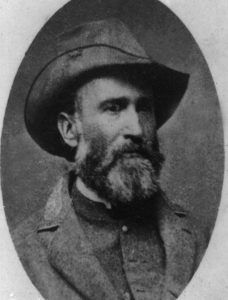Jubal Anderson Early was a Virginia lawyer and politician who became a Confederate general during the Civil War.
Early was born in Franklin County, Virginia, to Joab and Ruth Hairston Early on November 3, 1816. Part of a well-connected family, he attended private schools as a child and graduated from the United States Military Academy at West Point, New York, in 1837. After graduating, he fought in the Seminole Wars in Florida.
Before the Civil War began, he worked as a lawyer and was a member of the Whig party, which did not particularly support secession. However, when President Abraham Lincoln called for 75,000 volunteers to support the Union in 1861, he was moved to defend the South. Early rose quickly through the ranks of the Confederate army, starting out as colonel of the 24th Virginia Infantry before being promoted to brigadier general, major general, and eventually lieutenant general.
He served under Stonewall Jackson and Robert E. Lee for almost the entire war. As a lieutenant general, he commanded an infantry corps in the Army of Northern Virginia. As the Confederate commander, he was engaged in the Seven Days Battles, Second Manassas, Antietam, Fredericksburg, and Gettysburg. In the 1864 Overland Campaign, he fought at the Wilderness, assumed temporary command of the II Corps at Spotsylvania, and was named commander of the III Corps at the Battle of Cold Harbor.
As the armies settled into siege lines at Petersburg, Robert E. Lee sent Early and his corps marching north, hoping Ulysses S. Grant would dispatch troops to deal with the threat, easing pressure against his Petersburg lines. In the ensuing Shenandoah Valley Campaign, Early mounted the Confederacy’s last invasion of the North, driving Union forces westward and ultimately threatening Washington, D.C., before being turned back at the Battle of Fort Stevens. In the war’s final months, however, Early – known to his troops as “Old Jube” – suffered a string of defeats, including the Battle of Winchester, the Battle of Fisher’s Hill, and the Battle of Cedar Creek. He was eventually relieved of command by Lee in the wake of a disastrous defeat at Waynesboro in March 1865.
After the South surrendered, he went on the lam, escaping to Mexico, Cuba, and Canada before being pardoned by President Andrew Johnson in 1868. He spent the last years of his life in Lynchburg, Virginia, again practicing law and promoting the Lost Cause movement. He died in Lynchburg, Virginia, on March 2, 1894, and was buried there at the Spring Hill Cemetery.
© Kathy Alexander/Legends of America, updated January 2023.
Also See:
American Wars and Military Photo Galleries

